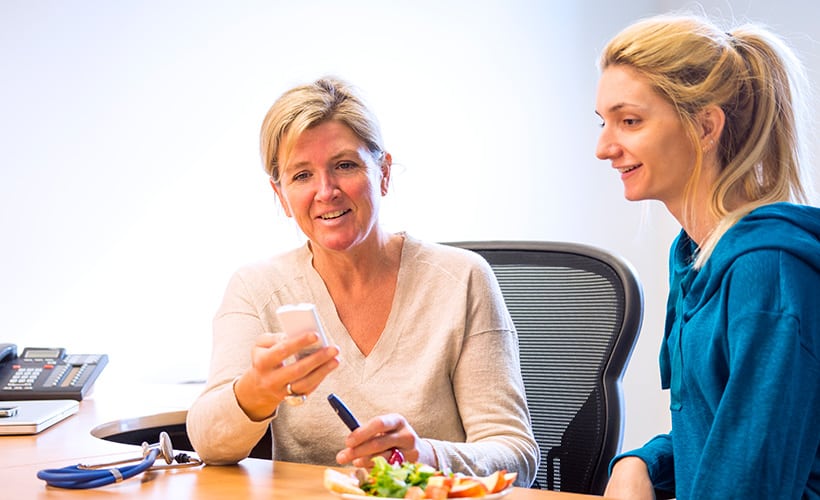All Categories
Featured
Table of Contents
-1
In the United States and several other countries, a dietitian is a board-certified food and nutrition expert. They are extremely informed in the area of nourishment and dietetics the scientific research of food, nourishment, and their impact on human wellness. Via considerable training, dietitians get the experience to provide evidence-based clinical nutrition therapy and nutritional counseling tailored to satisfy a person's demands.
-1To gain these credentials dietitians-to-be must first make a bachelor's degree or comparable credit histories from a certified program at an university or university. Generally, this calls for an undergraduate scientific research level, including training courses in biology, microbiology, organic and inorganic chemistry, biochemistry, anatomy, and physiology, as well as even more specific nutrition coursework.
Sports Nutrition Support
-1This enables them to analyze severe demands, focusing on deadly problems. Inpatient and outpatient dietitians also give nourishment education and learning to individuals with specialized requirements, such as those recently out of surgery, in cancer treatment, or diagnosed with chronic health problems like diabetes mellitus or kidney condition. In the outpatient setting, they provide extra extensive dietary therapy working in the direction of a nutrition-oriented objective.
-1They can also promote for public policies with an emphasis on nourishment, food, and health problems. Research study dietitians usually operate in research hospitals, organizations, or colleges. They run within a study team headed by a key detective and perform nutrition-focused treatments. Once dietitians have made their qualifications and are operating in the field, they can take place to focus on a certain subcategory, such as pediatrics or sports dietetics.
-1Others might work as wellness and nourishment professionals in media or as public speakers (Senior Nutrition). Dietitians are qualified to manage nutrition treatment throughout a period of intense and chronic problems.
Functional Medicine Dietitian
-1In several states, such as Alaska, Florida, Illinois, Maryland, Massachusetts, and Pennsylvania, RDs and CNSs are provided the same state license, normally called an Accredited Dietitian Nutritionist (LDN) certificate. In states that don't regulate using this term, anyone with an interest in diet or nourishment might call themselves a nutritional expert.
-1However, due to the fact that uncredentialed nutritional experts typically lack the proficiency and training for clinical nourishment treatment and nourishment counseling, following their guidance might be considered hazardous (). Prior to seeking advice from a nutritional expert, you might intend to inspect whether your state manages that may utilize this title. In the U.S. states that do not control the term, no levels or qualifications are needed to be a nutritionist.

-1
In states that do mandate licensure, the CNS or RD credential may needed. Those with CNS credentials are wellness experts like registered nurses or physicians with advanced health degrees who have chosen extra coursework, finished supervised technique hours, and passed a test managed by the Board for Qualification of Nutrition Specialists.
-1While a few of these methods might have durable clinical backing, others might not. Giving nourishment recommendations without the correct expertise and training can be harmful, specifically when counseling those with wellness problems. Therefore, if you are taking into consideration consulting a nutritional expert, you may desire to ask if they are a CNS or have state licensure or qualification, or an additional credential.
Ibs Dietitian (Coolbinia)
-1Numerous states particularly regulate this term. Furthermore, nutritional experts may seek an advanced CNS accreditation.
-1It can be challenging to assist individuals make authentic, lasting changes in their lives. Both dietitians and nutritionists give an array of nutrition-based solutions to customers.
-1They need to have finished some degree of education and learning in their field. They are likewise called for to have completed up to a year of supervised job, functioning within an assisted program at a medical care center, providing organization, or area body. Dietitians have far greater expectations positioned on their capabilities and level of professionalism and reliability.
-1This means that there is no body that oversees their credentials and no especially stringent standards that nutritionists need to comply with in order to be able to practice. Dietitians, on the various other hand, are signed up with country wide recognised bodies, such as the Dietitians Organization of Australia. They must comply with the National Expertise Standards for Dietitians.
Clinical Nutritionist ( Stirling 6050)

-1
You can exercise as a nutritional expert without the exact same level of accreditation as a dietitian. Nutritional expert training courses can vary in size and top quality, with some as brief as six weeks and covering much much less content than a dietetics program. Relying on your education and learning carrier, you can acquire a substantial amount of expertise via studying a straightforward nourishment training course; however it is essential to explore the training course material prior to beginning.
-1This can include participating in industry seminars or checking out industry publications. Nutritional experts, on the other hand, typically gain their credentials in order to supplement various other certifications and offer far better suggestions to their customers. Nutritional experts can acquire employment in a vast array of areas, consisting of public wellness recommendations, guidance for people, and collaborating with personal organisations.
-1Nutritionists can work with sporting organisations, health clubs, colleges and encourage media outlets on fundamental terms and appropriate use of terms. Dietitians can function in many of the same functions as nutritional experts.
Dietitian For Diabetes Type 2 – Coolbinia
-1Dietitians commonly function with even more clinically delicate clients. These can include those with diabetic issues, allergic reactions, excessive weight, cancer and gastrointestinal illness. Due to the high degree of understanding needed to provide services to these individuals, just accredited dietitians are permitted to offer care. A few of the greater degree duties with medical care establishments can be really gratifying, and pay quite well.
-1In Australia there is a difference in between a dietitian and various other dietary health carriers including nutritionists. All dietitians are nutritionists, yet nutritionists without a dietetics qualification can't call themselves a dietitian. While there are resemblances in between a dietitian and nutritional expert there are distinctions in credentials and regulation. The dietetic profession is controlled and meets rigorous standards as established out by the National Alliance of Self Regulating Health And Wellness Professions (NASRHP).
-1Dietitians with the Accredited Practising Dietitian (APD) credential dedicate to continuous training and education and learning throughout their jobs. They follow our standard procedure. Dietitians have the expertise and abilities discovered in the National Proficiency Specifications for Dietitians. As a career, nutritionists are not managed in Australia under NASRHP or licensed under a single regulatory body.
Nutritionist For Weight Gain – Stirling
-1If you have a persistent wellness condition and a treatment strategy from your General practitioner, you might be able to assert a Medicare refund when you see an APD. The main function of individuals working in the occupation of dietetics is symbolized in this declaration: The occupation of dietetics contributes to the promo of wellness and the avoidance and therapy of ailment by optimizing the nutrition of populations, communities and people. Gut Health Dietitian.
Latest Posts
Weight Loss Programs
How Do I Choose A Accredited Practising Dietitian Service?
Performance Nutritionist